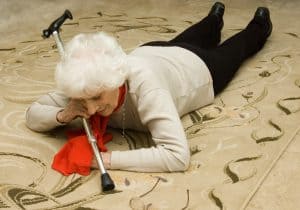
A fall can be scary and confusing for someone living with cognitive decline, making asking for help more difficult
The announcement that Bruce Willis is stepping down from acting due to a diagnosis of aphasia has brought cognitive health back into the national spotlight. Any type of cognitive decline, dementia or not, can cause safety concerns for the person. There are many ways to ensure safety and fast emergency response, including medical alert devices, but these devices only work if the person is able to effectively use them.
Here are some of the best medical alerts for seniors living with Alzheimer’s, dementia, and other cognitive health challenges, as well as what to look for when you are choosing the best option for your loved one’s abilities. Our Medical Guardian reviews can help you sort through which system is right for you.
How Cognitive Health Impacts Using Medical Alert Devices
Cognitive decline doesn’t just affect memory. In fact, dementia and other cognitive conditions can cause challenges with good judgment, communication, critical thinking, and following multi-step instructions. This means that operating a medical device can be frustrating, challenging, and sometimes impossible for someone living with dementia or Alzheimer’s.
Using a medical alert device requires more than just pushing a button. It also requires the person to know they are in an emergency situation, know they need help, and then know how to press their alert button and communicate with the operator who answers. This is a complex set of tasks that can become even more difficult in the midst of an emergency, especially when pain or disorientation is involved.
What to Look for When Choosing a Medical Alert for Seniors with Dementia

A fall detection sensor system at home can detect potential falls to report to a family caregiver who can then call to follow up
Having a medical alert system and plan is still important for someone living with dementia, especially if they live alone. There are some things you can look for that could increase the ease of use for your loved one, which can make them use it in case of emergency.
Here are a few things to look for:
A water resistant button that is easy to see and easy to press
A device with multiple buttons or instructions might not be best for someone living with dementia. Look for the most simplified version you can find and one that is water resistant so it can be used in the shower.
Fall detection technology
A medical alert device that can predict if a fall happened and then follow up with the user can make the person pressing their own button obsolete. Look for a device that has fall detection technology and the automatic response process that happens when a potential fall is detected.
GPS tracking technology
Be sure the device you are looking at for your loved one has the ability to track where your loved one is when they ask for help. Having GPS coordinates easily available can help first responders be dispatched to their exact location, even if your loved one cannot tell them where they are.
In-home fall detection
Finally, it might be best to find an in-home system that monitors for falls and behavior based on sensors throughout the home. Companies like Cherry Home and Aloe Care Health use technology that maintains privacy while monitoring for potential fall activity. In the case of a potential fall, the system automatically calls the monitoring center and can send a message to designated family caregiver through a smartphone app so that the caregiver can follow up with a phone call or visit.
What to Avoid
There are many options of medical alert devices that would be suitable for someone living with dementia, Alzheimer’s, or other cognitive condition. You know your loved one best and can determine which type of device might work better than others. However, there are some characteristics you might want to avoid:
- Any device or system that is confusing to set up or maintain
- Any device that has multiple buttons, indicator lights, or other items that can be distracting or confusing
- Any device that “talks” to remind when a battery needs to be charged, when maintenance is due, or any other situation. This can be particularly confusing and alarming to someone living with dementia, especially as they approach the middle stage of the disease
- Expensive devices with multiple features when your loved one will likely only use one or two
Do Your Research
As you begin to compare and contrast medical devices for your loved one, be sure to think about your loved one’s needs and challenges now, as well as what those might be in the future. Consult with your loved one’s neurologist to see what their referrals might be as well so that you can invest in a system they will be able to use for the short and long-term. Reading reviews of popular products can also give you a good idea of where to start.


